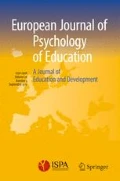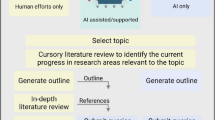Abstract
This paper consists of two major parts. First, research exploring possible interactions between metamemory and domain-specific knowledge in influencing children’s text recall and comprehension is briefly summarized. Overall, the findings indicate that metacognitive knowledge does make a difference even in cases where domain-specific knowledge is rich. Second, a recent experiment conducted in our lab and investigating the generalizability of this conclusion for sort-recall tasks is described in more detail. Third — and fourth-grade soccer experts and novices were first given a comprehensive metamemory questionnaire and then administered a sort-recall tasks using two different picture lists: whereas one list included items from various semantical categories (e.g., animals, clothes), the other list was composed of soccer pictures that could be classified in several categories such as players, kicks, or equipment. The results showed that although domain-specific knowledge had a strong impact on recall of the soccer list, general metacognitive knowledge made an independent contribution, particularly for the group of soccer experts. More specifically, good metamemory positively affected the recall of experts but had no impact on novices’ memory performance.
Résumé
Cet article comporte deux parties principales. Dans la première partie, les auteurs dressent un bref résumé des recherches étudiant l’influence d’effets d’interactions entre la métamémoire et le domaine spécifique de connaissance sur le rappel et la compréhension de texte. Dans l’ensemble, les recherches montrent que la connaissance métacognitive introduit vraiment une différence même dans les cas où le domaine spécifique de connaissance est riche. Dans la seconde partie, les auteurs décrivent plus en détail une expérimentation récente conduite dans leur laboratoire pour étudier la généralisabilité de cette conclusion pour des «sort-recall tasks». On a d’abord soumis des footballeurs experts et novices de troisième et quatrième années (9 et dix ans) à un questionnaire de métamémoire, puis on leur a administré une sort-recall task utilisant deux différentes listes d’images: l’une des listes était composée d’items de différentes catégories sémantiques (comme animaux, vêtements), alors que l’autre était composée d’images de football pouvant être classées en plusieurs catégories telles que joueurs, tirs, ou équipement. Les résultats montrent que bien que le domaine spécifique de connaissance ait eu un impact marqué sur le rappel de la liste de football, la connaissance métacognitive générale a eu cependant un effet indépendant, notamment pour le groupe d’experts. Plus spécifiquement, une bonne métamémoire a eu un effet positif sur le rappel des experts mais n’a pas eu d’effet sur la performance mnésique des novices.
Similar content being viewed by others
References
Brown, A.L., Bransford, J.D., Ferrera, R.A., & Campione, J.C. (1983). Learning, remembering, and understanding. In J.H. Flavell & E.M. Markman (Eds.),Handbook of Child Psychology (vol. 3, Cognitive development, pp. 77–161). New York: Wiley.
Ericson, K.A., Krampe, R.T., & Tesch-Römer, C. (1993). The role of deliberate practice in the acquisition of expert performance.Psychological Review, 100, 363–406.
Flavell, J.H., Miller, P.H., & Miller, S.A. (1993).Cognitive Development (3rd ed.) Eaglewood Cliffs, NJ: Prentice Hall.
Guttentag, R.E. (1989). Dual-task research and the development of memory.Journal of Experimental Child Psychology, 47, 26–31.
Heller, M.S., Gädike, A.K., & Weinläder, H. (1985).Kognitiver Fähigkeitstest für 4. bis 13. Klassen (KFT 4–13). Weinheim: Beltz.
Körkel, J., & Schneider, W. (1992). Domain-specific versus metacognitive knowledge effects on text recall and comprehension.Learning and Instruction, 3, 311–323.
Moely, B.E., Santulli, K.A., & Obach, M.S. (1995). Strategy instruction, metacognition, and motivation in the elementary school classroom. In F.E. Weinert & W. Schneider (Eds.),Memory performance and competencies. (pp. 301–321). Mahwah, NJ: Erlbaum Associates.
Pressley, M., Borkowski, J.G., & Schneider, W. (1990). Good information processing: What it is and how education can promote it.International Journal of Educational Research, 14, 857–876.
Pressley, M., & McCormick, C.B. (1995).Advanced Educational Psychology for Educators, Researchers, and Policymakers. New York: Harper Collins College Publishers.
Schneider, W., & Bjorklund, D.F. (1992). Expertise, aptitude, and strategic remembering.Child Development, 63, 461–473.
Schneider, W. Bjorklund, D.F., & Maier-Brückner, W. (1996). The effects of expertise and IQ on children’s memory: When knowledge is, and when it is not enough.International Journal of Behavioral Development, 19, 2–26.
Schneider, W., Borkowski, I.G., Kurtz, B.E., & Kerwin, K. (1986). Metamemory and motivation: A comparison of strategy use and performance in German and American children.Journal of Cross-Cultural Psychology, 17, 315–336.
Schneider, W., Körkel, J., & Weinert, F.E. (1989). Domain-specific knowledge and memory performance: A comparison of high — and low-aptitude children.Journal of Educational Psychology, 81, 306–312.
Schneider, W., Körkel, J., & Weinert, F.E. (1990). Expert knowledge, general abilities, and text processing. In W. Schneider & F.E. Weinert (Eds.),Interactions among aptitudes, strategies, and knowledge in cognitive performance (pp. 235–249). New York: Springer-Verlag.
Schneider, W., & Pressley, M. (1997).Memory development between 2 and 20 (2nd ed.). Mahwah, NJ: Erlbaum Associates.
Author information
Authors and Affiliations
Rights and permissions
About this article
Cite this article
Schneider, W., Schlagmüller, M. & Visé, M. The impact of metamemory and domain-specific knowledge on memory performance. Eur J Psychol Educ 13, 91–103 (1998). https://doi.org/10.1007/BF03172815
Received:
Issue Date:
DOI: https://doi.org/10.1007/BF03172815




